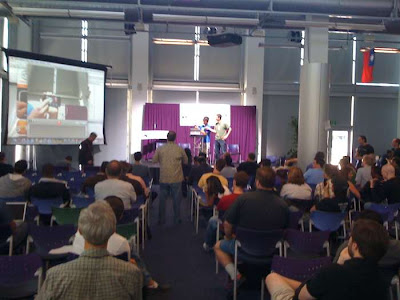
I’m a staff volunteer here at iPhoneDevCamp 3 this weekend down at Yahoo! trying to learn about my side interest creating iPhone apps. To me, this is an interesting space to watch since it’s a fresh, booming, and alluring new space ripe with opportunity.
With the lack of centralized metrics and monetization best practices in this space I’ve decided to post my small sample of my learnings here:
Game Apps (source: Tadow! guys)
- Less than 25% of people who download an app ever use it and within a few months less than 1% of people continue to use it
- 1 in 10 gamers will play an app more than 25 times
- Top 25 paid apps get 500-10,000 downloads a day
- 77% of all apps in the app store are paid (as opposed to free)
- If your app doesn’t get into the top 25 in the first week it probably never will
- Launch your app on Tuesday or Wednesday to seed user growth in order to increase chances you’ll get higher visibility over the weekend when app traffic is highest. Once your app has been approved Apple lets you choose launch date.
- If paid, consider buying ads on free apps similar to help drive traffic to yours
- Start your pricing high, then lower the price as needed
- Consider a launch strategy targeting very specific locals—the iTunes store has 88 different locations. This will allow you to target long tail and emerging market locales.
- To get to the coveted Top 25 the app must have a rating of 3.5 or above. Challenge: most users only take the time to rate apps if they have negative feedback.
- It helps to have a paid and a light version, but you must provide adequate incentive to upgrade. Ex: a game who’s light version only gives access to first 3 of 10 levels. 50% of light users convert to paid, and you can monetize using ads on the free light version.
- Lots of small iPhone development shops are springing up. Examples include: Dollar Apps, Small Society, Sugar Cube, and more.
- A iPhone developer for hire costs anywhere around $75-$150 an hour depending on the project
Other impressions of the weekend: there’s a wide variety of attendees here and my general take is that most of them don’t have an app in the store. Lots have ideas, hustle, and are looking to learn more. And then there are the familiar looking uber geeky conference junkies I won't get into here, because they are such bizarre examples of humanity they deserve another post entirely.
In conclusion, the paint’s still wet, the possibilities exciting, and as legendary Andy Stone said in his keynote we are, “Ready for the NeXT (same old) big thing”

